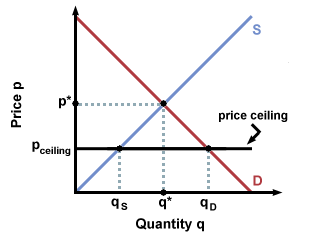Theoretically, if left alone, a market will naturally settle into equilibrium, where the price is such that all sellers who are willing to sell at that price, and all buyers who are willing to buy at that price, both get what they want. The picture gets messier when government puts in place price ceilings or price floors, or charges taxes on transactions.
A price ceiling is an upper limit for the price of a good or service: once the ceiling has been established, by law sellers cannot charge more than that. If the ceiling is at or above the natural market price, the market finds its equilibrium just the same as if the ceiling didn’t exist. Economists say that the ceiling is nonbinding—which doesn’t mean that it’s optional, just that the ceiling is not actually doing anything. On the other hand, when a price ceiling is set below the market price, it is called a binding price ceiling.
What is the effect of a binding price ceiling? Imagine that a government thinks 1) that people need bread to live, and 2) that the market price of bread is too high, and therefore establishes a ceiling on the price of bread. Assume that the following graph represents the market for bread. Without a price ceiling, at equilibrium, the price will be \(p*\), and the quantity will be \(q*\). The price ceiling limits the price to pceiling.

With the price set as high as it is allowed to go, pceiling, we can see that the quantity demanded, \(q_D\), will exceed the quantity supplied, \(q_S\), meaning that not enough bread will be supplied to satisfy demand. Such a situation is called a shortage. Because price ceilings are installed in the interests of the buyers, the government has to decide which situation is preferable: a situation where bread is expensive for all buyers, or one where some buyers obtain bread at an affordable price but the rest are left empty-handed.













